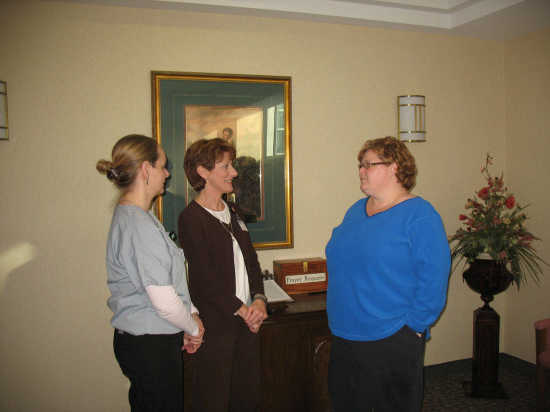'No one dies alone'

Nevada, Mo. -- Having been a good example for many things, Mother Teresa's approach to comforting the dying has been taken to heart at Nevada Regional Medical Center.
Unveiling her No One Dies Alone program, NRMC Social Services Supervisor Susie Platt quotes the Catholic saint (1910-'97) to say, "No one should die alone. Each human should die with the sight of a loving face."
After a year's preparation, Platt has recruited 10 volunteers from the hospital's dormant hospice program and staff to take a three-hour orientation course and refine the volunteers' natural attributes. "You have to be emotionally strong and have a caring heart along with experience with grief and loss," she said.
"We haven't had the need yet, but we have had situations in the past where strangers died. The nurses and social workers would love to stay with somebody when they know the person is dying, but they have work to do. They can't just stay in there."
Platt said Acute Care Manager Kelly Eastwood and Chief Nursing Officer Cory Vokoun are acquainting house supervisors with NODA because the volunteers are ready and it is of course unknown when they'll be needed. "It could be that their family lives a long ways away and can't come," she said.
"The volunteers act as 'compassionate companions' by sitting with the person, perhaps holding their hand, reading to them, playing soft music and providing a reassuring presence at the bedside of a patient who would otherwise be alone.
"If you ask, most people tell you their top two fears about dying are pain and dying alone. We all wish for a painless death in the presence of someone who cares.
"But what about the person who has outlived his or her family or friends or is a lone traveler, just passing by, who comes to NRMC after an accident? Why should these people die without human companionship?"
Platt said the hospital's 13 chaplains also give spiritual guidance to those who want it.
Kee Bausch, NRMC's medical staff coordinator and a NODA volunteer, grew more aware of the dilemma when her mother, 45-year-old emergency room nurse Gayle Alexander, was terminally ill with bladder cancer seven years ago.
"My sister, Chastity McCullick, and I were with her all the time, but I saw people who didn't have anyone," said Bausch, whose sister is an obstetrics nurse.
Platt said the situation will usually become apparent before a volunteer arrives. "The doctors tell them, but a lot of times they know before anybody else," she said.
"We see our care as more than just the physical. We want to meet all the needs of the patient. We can provide companionship for those facing the dying process and in doing so provide the gift of dignity and respect to another human being at the end of life."
